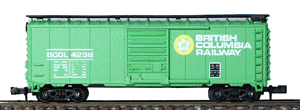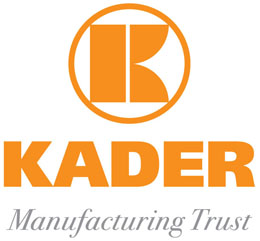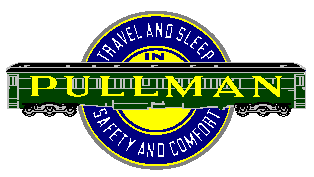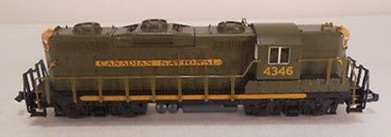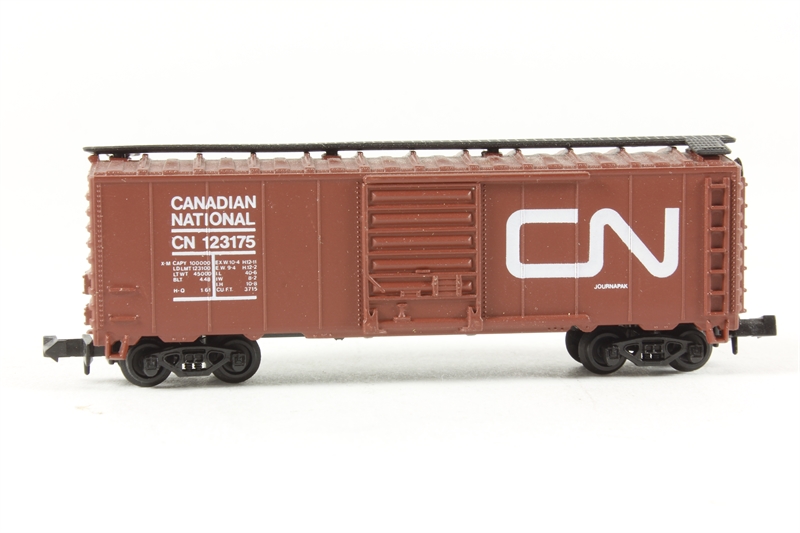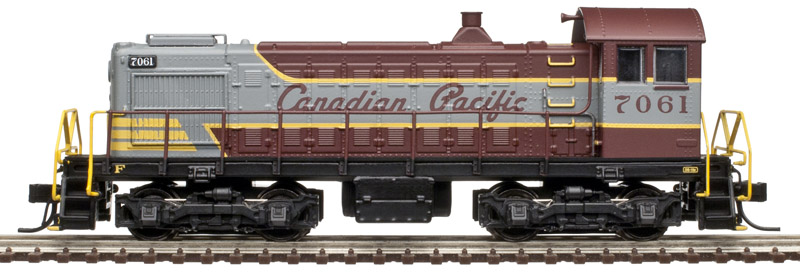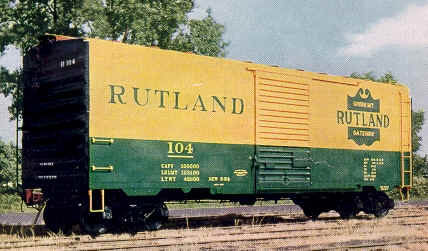Model Information: This Model Power tooling is a Chinese knock off of the New Jersey made 1976 vintage Atlas PS-1 boxcar. It was also imported by Life-Like. We are not sure of this was a deal struck between Model Power and Life-Like (who were presumably competitors) or if the Chinese factory simply decided to sell to Life-Like as well as Model Power. The Life-Like models are identical to the Model Power models.
Model Power re-ran their previous Mehano-made models with this new tooling, using the same roadnames and numbers and the same stock number. The main difference between the Mehano and the Chinese molds can be observed on the door. The best way to distinguish them remains however the marking on the under-frame (Yugoslavia or Hong-Kong)
This model is of equivalent quality to the Atlas version (perhaps even sharper molding and lettering). It likely appeared in the late 1980s when Model Power contracted with Chinese manufacturers to replicate various successful toolings from Europe (Roco, Lima) and the US (Atlas). Like all of this group of models, these care feature Rapido couplers attached to trucks with injection-molded plastic wheels. Most of these models look fine on a modern layout and will run well once you swap the Chinese trucks for MTL Bettendorf truck/couplers.
Model Power re-ran their previous Mehano-made models with this new tooling, using the same roadnames and numbers and the same stock number. The main difference between the Mehano and the Chinese molds can be observed on the door. The best way to distinguish them remains however the marking on the under-frame (Yugoslavia or Hong-Kong)
This model is of equivalent quality to the Atlas version (perhaps even sharper molding and lettering). It likely appeared in the late 1980s when Model Power contracted with Chinese manufacturers to replicate various successful toolings from Europe (Roco, Lima) and the US (Atlas). Like all of this group of models, these care feature Rapido couplers attached to trucks with injection-molded plastic wheels. Most of these models look fine on a modern layout and will run well once you swap the Chinese trucks for MTL Bettendorf truck/couplers.
Prototype History: The 40' Boxcar is widely known as one of the most popular freight cars used by railroads as they transitioned from steam to diesel. In particular the Pullman Standard or PS-1 design was one of the most popular and was widely used by North American railroads. These boxcars were built beginning in 1947 and share the same basic design, with certain elements such as door size, door style or roof type varying among the different railroads and production years. When production of these cars ceased in 1963, over 100,000 had been produced.
So just what is a PS-1? Well the simple answer is it is any boxcar built by Pullman Standard from 1947 on. The design changed over the years – sometimes subtly, sometimes for customer request, and sometimes in a larger way. In general, most PS-1’s built from 1947 to 1961 share the same dimensions and basic construction techniques. These cars all had a length of 40′, a height of 10’5″ or 10’6″, welded sides and ends and roof of Pullman’s own design. The greatest variation was in the size and style of doors used. Pullman Standard also offered 50′ and later 60′ boxcars – also with the PS-1 designation.
So just what is a PS-1? Well the simple answer is it is any boxcar built by Pullman Standard from 1947 on. The design changed over the years – sometimes subtly, sometimes for customer request, and sometimes in a larger way. In general, most PS-1’s built from 1947 to 1961 share the same dimensions and basic construction techniques. These cars all had a length of 40′, a height of 10’5″ or 10’6″, welded sides and ends and roof of Pullman’s own design. The greatest variation was in the size and style of doors used. Pullman Standard also offered 50′ and later 60′ boxcars – also with the PS-1 designation.
Road Name History: BC Rail (reporting mark BCOL, BCIT), known as the British Columbia Railway between 1972 and 1984 and as the Pacific Great Eastern Railway (PGE) before 1972, was a railway that operated in the Canadian province of British Columbia between 1912 and 2004. It was a class II regional railway and the third-largest in Canada, operating 2,320 km (1,440 mi) of mainline track. Its operations were owned by the public as a crown corporation from 1918 until 2004, when the provincial government leased operations for 999 years to CN. The track and other assets, including a marine division and stevedoring subsidiary as well as large tracts of real estate, remain under public ownership. 40 km of track serving the Roberts Bank Superport that were scheduled to be sold to OmniTRAX remain under BC Rail management due to that sale being cancelled because of the transaction being tainted by an influence-peddling and bribery scandal resulting in convictions in 2010. The provincial government, which promised when originally elected to never sell the railway, has announced that the crown corporation and its remaining operations and assets would be "wound down" and taken over by various departments of the Ministry of Transportation The details of the sale/lease to CN, which are related to the OmniTRAX affair, have become the subject of protracted public inquiry as part of the proceedings of the trial surrounding a scandal known as the British Columbia Legislature Raids Affair, or "Railgate". Government leaders and civil servants involved with the arrangements to CN have refused to comment on the deal because the matter "is before the courts".
Chartered in 1912, the railway was acquired by the provincial government in 1918 after running into financial difficulties. A railway that ran "from nowhere, to nowhere" for over 30 years, neither passing through any major city nor interchanging with any other railway, its southern terminus was at Squamish and its northern terminus at Quesnel during that period. It expanded significantly between 1949 and 1984. Primarily a freight railway, it also offered passenger service, as well as some excursion services, most notably the Royal Hudson excursion train. The railway's operations only reached profitability in 1980, due to large capital and operating debts, which were intended as subsidies to develop and sustain mining and timber economies and employment in the regions it accessed, though during the 1980s it regularly posted significant profits, contributing to the public treasury significantly, and maintained a lower operating debt than any of the continent's other major railways. The railway's operations and management, as one of the province's largest crown corporations, have necessarily been at the centre of public debate since its takeover. Notably, as example, the Social Credit governments of WAC Bennett and his son Bill Bennett forgave the railways' capital debts in 1954 and 1979, respectively, with bookkeeping matters related to that bringing much criticism. The current provincial government has been accused of fabricating falsehoods about the state of its debts and viability in order to justify the deal with CN, claiming the railway was in disarray. Other participants in the bidding process withdrew their bids, saying that CN had unfair access to confidential information about their own operations, provided by the government, and at least one bidder (Canadian Pacific) privately stated in since-released communications that the bid was "rigged". Controversy over CN's management of the line has focused on layoffs, toxic spills and other safety concerns, and cuts in service to some regions. The line has generated profits for CN in the range of $25 million per year since its takeover of the railway's operations.
Chartered in 1912, the railway was acquired by the provincial government in 1918 after running into financial difficulties. A railway that ran "from nowhere, to nowhere" for over 30 years, neither passing through any major city nor interchanging with any other railway, its southern terminus was at Squamish and its northern terminus at Quesnel during that period. It expanded significantly between 1949 and 1984. Primarily a freight railway, it also offered passenger service, as well as some excursion services, most notably the Royal Hudson excursion train. The railway's operations only reached profitability in 1980, due to large capital and operating debts, which were intended as subsidies to develop and sustain mining and timber economies and employment in the regions it accessed, though during the 1980s it regularly posted significant profits, contributing to the public treasury significantly, and maintained a lower operating debt than any of the continent's other major railways. The railway's operations and management, as one of the province's largest crown corporations, have necessarily been at the centre of public debate since its takeover. Notably, as example, the Social Credit governments of WAC Bennett and his son Bill Bennett forgave the railways' capital debts in 1954 and 1979, respectively, with bookkeeping matters related to that bringing much criticism. The current provincial government has been accused of fabricating falsehoods about the state of its debts and viability in order to justify the deal with CN, claiming the railway was in disarray. Other participants in the bidding process withdrew their bids, saying that CN had unfair access to confidential information about their own operations, provided by the government, and at least one bidder (Canadian Pacific) privately stated in since-released communications that the bid was "rigged". Controversy over CN's management of the line has focused on layoffs, toxic spills and other safety concerns, and cuts in service to some regions. The line has generated profits for CN in the range of $25 million per year since its takeover of the railway's operations.
Brand/Importer Information: Founded in the late 1960's by Michael Tager, the 3rd generation business specializes in quality hobby products serving the toy and hobby markets worldwide. During its 50 years of operation, Model Power has developed a full line of model railroading products, die-cast metal aircraft, and die-cast metal cars and trucks.
In early 2014, Model Power ceased its business operations. Its extensive portfolio of intellectual property and physical assets are now exclusively produced, marketed, sold, and distributed by MRC (Model Power, MetalTrain and Mantua) and by Daron (Postage Stamp Airplanes and Airliner Collection).
In early 2014, Model Power ceased its business operations. Its extensive portfolio of intellectual property and physical assets are now exclusively produced, marketed, sold, and distributed by MRC (Model Power, MetalTrain and Mantua) and by Daron (Postage Stamp Airplanes and Airliner Collection).
Manufacturer Information: Kader Industrial Company Limited was founded in Hong Kong in 1948 by Ting Hsiung Chao. It was listed on the Hong Kong Stock Exchange in 1985 and presently trades under the name of "Kader Holdings Company Limited".
The company today is one of the world's largest manufacturers of toy and hobby railways, and also has wider manufacturing interests as well as substantial investments in property. The vision of Mr. Ting Hsiung Chao is shared by the Ting family, which continues to lead the Kader Group. Kader's initial focus product was to manufacture plastic flashlights, which at the time were a novelty.
The company today is one of the world's largest manufacturers of toy and hobby railways, and also has wider manufacturing interests as well as substantial investments in property. The vision of Mr. Ting Hsiung Chao is shared by the Ting family, which continues to lead the Kader Group. Kader's initial focus product was to manufacture plastic flashlights, which at the time were a novelty.
Item created by: CNW400 on 2023-02-02 09:27:32
If you see errors or missing data in this entry, please feel free to log in and edit it. Anyone with a Gmail account can log in instantly.
If you see errors or missing data in this entry, please feel free to log in and edit it. Anyone with a Gmail account can log in instantly.


